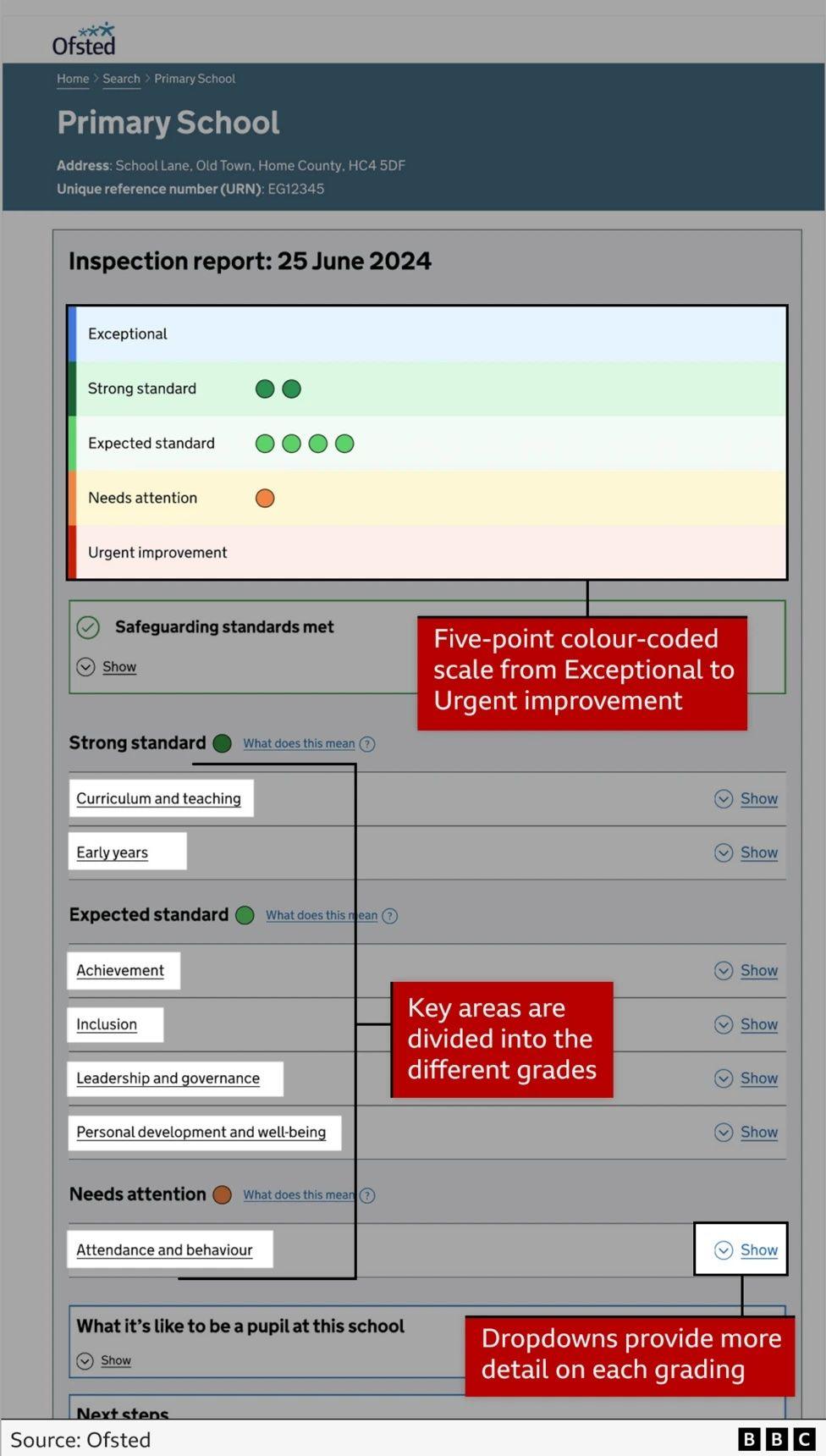What is Ofsted and how will the new school ratings work?

- Published
Ofsted's new report card grading system has come into effect for schools in England, after the inspectorate scrapped its old one or two-word judgements.
Ofsted says the updated system will give parents better detail about schools, and the government says it will help raise standards for children.
But critics say the new inspections will continue to put pressure on teachers and school leaders, arguing that some of the worst aspects of the old system have not changed.
What does Ofsted mean and what are the ratings?
Ofsted - the Office for Standards in Education, Children's Services and Skills, external - inspects and reports on anywhere that provides education for young people in England, including schools, colleges, nurseries and childminders.
Many parents and carers rely on Ofsted ratings to help them choose a school or nursery for their child.
Previously, schools or organisations were inspected every four years - or within 30 months, depending on their status - and were given one of the following four overall grades:
1 - outstanding
2 - good
3 - requires improvement
4 - inadequate
Ofsted also inspects some independent schools in England, while others are assessed by the Independent Schools Inspectorate, external.
Inspections in Wales are carried out by Estyn, external, in Scotland by Education Scotland, external, and in Northern Ireland by the Education and Training Inspectorate, external.
How have school inspections changed?
Ofsted inspections no longer give a single overall grade to an institution.
Estyn in Wales and the body that inspects Church of England schools and academies, external also both moved away from a single grade approach.
England's updated system, introduced in November 2025, includes several grades for different parts of school life, with narrative summaries then giving more details about each area.
The areas schools are assessed on include:
curriculum and teaching
achievement
inclusion
leadership and governance
personal development and wellbeing
attendance and behaviour
early years and post-16 provision (for schools that have them)
There will be five possible grades for each area:
urgent improvement
attention needed
expected standard
strong standard
exceptional
A separate part of the report card will say whether the school's duties around safeguarding have been met.

An example of a new Ofsted inspection report
Why are the changes controversial?
Ofsted announced it would be scrapping its old single-word judgements for schools in 2024, following the death of head teacher Ruth Perry in January 2023. She had taken her own life after an Ofsted inspection which downgraded her school.
There had been a national outcry after Mrs Perry's death about the nature of school inspections, and a campaign to change the system by her sister Prof Julia Waters.
After announcing that the old system would be scrapped, the inspectorate said it would be replaced by the new report cards, which would be subject to a consultation period.
In September 2025, Ofsted said the new report card system would be implemented from November, despite claims from critics - including Prof Waters - that it had "failed to learn the lessons" from Mrs Perry's death, with a continuing "risk to the health and wellbeing of teachers and school leaders".
A legal challenge brought by the National Association of Head Teachers (NAHT) against the changes was thrown out by the High Court one week before the new system was introduced. The union later said it would consult its members on potential strike action.
The new system would be "better for parents" and "fair" to schools too, Ofsted's chief inspector Sir Martyn Oliver said following the court hearing.
Head teachers to be consulted on strike action over new Ofsted inspections
- Published3 November
Ofsted to bring in 'report card' school inspections despite criticism
- Published9 September
What happens after an Ofsted inspection?
Previously, schools rated inadequate became sponsored academies, external, and were supported by another "outstanding" school or charity to improve.
The new report cards will result in the government intervening more quickly to help struggling schools, Education Secretary Bridget Phillipson has said.
New regional teams, with a budget of up to £100,000 per school, will help turn around "stuck" schools that have received back-to-back negative judgements from Ofsted.
But those that fail to improve will be transferred to a successful academy trust, even if they are already run by a different academy or a council.

Can schools complain about their Ofsted rating?
Head teachers can challenge the rating their school is given.
Complaints are dealt with by a senior inspector who was not involved in the original assessment, external.
The way Ofsted handles the post-inspection period changed in April 2024, with the aim of resolving complaints more quickly, and increasing transparency around decision-making.